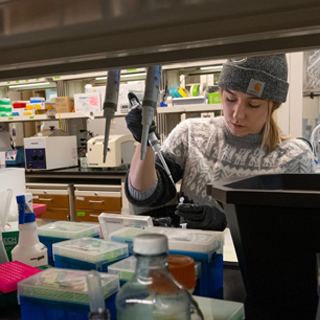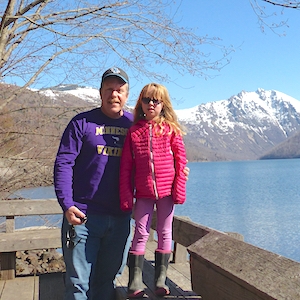People
Scott Wetzel
Associate Professor
Contact
- Office
- Charles H. Clapp Building, Room 216
- Phone
- 406 243-2168
- scott.wetzel@umontana.edu
- Office Hours
I maintain an open door policy and don't limit availability to students. I am available to meet with students pretty much anytime, so feel free to stop by. Alternatively, send me an email and we can set up an appointment to meet at a time that works best for you and your schedule.
Education
- 1987 - B.A. University of La Verne, La Verne, CA
Thesis: Mutagenic Potential of Common Chemicals using the Yeast Rho mutation as a readout. Mentors: Wendy Wooten and David Flittner
- 1992 - M.S. Emphasis in Microbiology and Immunology, California State Polytechnic University, Pomona, CA.
Thesis: Studies of the phagocytic capabilities of cultured epidermal Langerhans Cells and subsequent fungicidal activity after incubation with free and liposome encapsulated Amphotericin B. Mentors: Pamela Sperry and Jill Adler-Moore
- 2001 - Ph.D. in Immunology, Oregon Health Sciences University, Portland, OR.
Thesis: Imaging and analysis of the Immunological Synapse Formed Between CD4+ T lymphocytes and Antigen Presenting Cells. Mentor: David C. Parker
Courses Taught
BIOB 410 - Immunology
BIOB 411 - Immunology Lab
MICB 502 - Advanced Immunology
BIOB 596 - Principles of Light Microscopy
Teaching Experience
1996 - 2004 Instructor, Medical School Immunology, Oregon Health & Science University
1997 - 2004 Instructor, Clinical Laboratory Science Program, Oregon Health & Science University
2002 – 2004 Instructor, Biotechnology Department, Portland Community College
2002 – 2011 Faculty Member, International Course on 3D Microscopy of Living Cells, University of British Columbia, Vancouver, BC, Canada
2005 - 2013 Assistant Professor, Division of Biological Sciences and Center for Environmental Health Sciences, University of Montana, Missoula, MT
2013 - Present Associate Professor, Division of Biological Sciences and Center for Environmental Health Sciences, University of Montana, Missoula, MT
Research Interests
Work in my lab focuses on CD4+ T lymphocyte activation and subset differentiation.
We have 2 basic Research Areas:
1. The biological consequences for individual T cells of signaling induced by APC-derived membrane molecules after their transfer to T cells at the T-APC immunological synapse, a process termed “trogocytosis”.
2. The impact of the herbicide Atrazine on the activation of CD4+ T cells and the mechanism underlying a significant increase in Foxp3+ regulatory T cells
The Role of Trogocytosis-Mediated Signaling in CD4 Effector Subset and Memory T Cell Differentiation
CD4+ T lymphocytes recognize antigenic peptide fragments presented on the surface of antigen presenting cells (APC) by major histocompatibility complex (MHC) class II proteins. This initial antigen recognition is followed by large-scale spatial and temporal molecular rearrangements of plasma membrane proteins and intracellular signaling molecule leading to the formation of an ordered structure at the T-APC interface termed the immunological synapse. The synapse is involved in T cell signaling as well as the site for delivery of T cell effector functions. Our lab has previously shown that that molecules from the APC are transferred to the T cell at the immune synapse in a process called trogocytosis. This process is seen below with GFP-tagged MHC:peptide on the antigen presenting cell (green) and T cells (shown in polarized light in blue).
We are examining the biological significance of intercellular transfer of molecules from APC to T cells. We've shown that APC-derived molecules continue to engage their receptors on T cell and sustain intracellular signaling within the T cell, as shown in the movie below with co-localization of trogocytosed MHC:peptide (green), total phosphorylated tyrosine (blue) and phosphoylated Lck (red).
This signaling leads to the selective survival of these T cells in culture and drives the production of some effector cytokines (e.g. IL-4, IL-6, IL-21), while inhibiting production of other cytokines (e.g. IFN-gamma). Our work has shown that trogocytosis-mediated signaling ultimately induces expression of transcription factors and effector cytokines within the cells consistent with differentiation of cells towards a TH2 phenotype. The trogocytosis-mediated signaling also can induce the conversion of polarized TH1 cells toward a TH2 phenotype. We hypothesize that this may play an important role in control of immune responses - promoting TH2 and limiting potentially damaging TH1 responses.
In addition to driving TH2-associated gene expression patterns, we have also observed that trogocytosis-mediated signaling induces a cellular phenotype consistent with a second CD4 effector subset, the Bcl-6+IL-21+CXCR5+ follicular T helper cells (TFH). Our current work involves examining the potential for trogocytosis-mediated signaling to controbute to CD4 differentiation into TFH cells and analyze its impact on antibody responses in vivo.
Finally, we are just beginning experiments to analyze whether trogocytosis and trogocytosis-mediated signaling have a role in asymmetrical division and the development of CD4+ memory T cells from naive precursors.
Immunotoxicology of Atrazine
We are examining the impact on Atrazine on the activation and differentiation of CD4+ T cells. Atrazine is a very widely applied herbicide that the USGS estimates contaminates 70% of the ground water in the US. It has been linked to birth defects, cancer, immune developmental defects and modulation of immune cell effector functions. We have shown that Atrazine inhibits CD4+ T lymphocyte proliferation and effector function. In addition, we have shown that the frequency of Foxp3 positive regulatory T cells (Treg) doubles in atrazine-treated cultures. This is largely due to elevated levels of cAMP, as Atrazine is a potent phosphodiesterase inhibitor. We have recently found that male and female T cells respond differently to atrazine exposure. Atrazine's other biochemical effect is to induce expression of aromatase, which converts androgens to estrogen. We are currently examining the impact of Atrazine-induced elevated estrogen on the induction of Tregs and Atrazine-associated inhibition of T cell activation.
We are also examining whether the effects of atrazine on T cell function and fate are directly on the T cell or whether it is working via altering antigen presenting cell phenotype/activity.
Our ultimate goal with this project is to examine whether atrazine exposure alters or limits an in vivo immune response to tumors or infectious disease.
Field of Study
Cellular Immunology
CD4+ T Cell Subset Differentiation
Trogocytosis-Mediated Signaling
Immunotoxicology
Selected Publications
Reed, S.J., Reichelt, M., and Wetzel, S.A. (2021). Lymphocytes and Trogocytosis-Mediated Signaling, Cells10(6):1478 PMC8231098
Reed, S.J. and Wetzel, S.A. (2019) Trogocytosis-Mediated Intracellular Signaling in CD4+ T Cells Drives TH2-Associated Effector Cytokine Production and Differentiation. The Journal of Immunology. 202 (10): 2873-2887. PMCID: PMC6504583
Osborne, D.G. and Wetzel, S.A. (2012) Trogocytosis leads to sustained signaling in CD4+ T cells. The Journal of Immunology, 189(10):4728-39. PMID: 23066151
Scott A. Wetzel, T. W. McKeithan, D.C. Parker. (2005). Peptide-specific intercellular transfer of MHC class II to CD4+ T cells directly from the immunological synapse upon cellular dissociation. The Journal of Immunology. 174(1): 80-9
Publications
https://orcid.org/0000-0001-6843-4583
Reed, S.J., Reichelt, M., and Wetzel, S.A. (2021). Lymphocytes and Trogocytosis-Mediated Signaling, Cells10(6):1478 PMC8231098
Reed, S.J. and Wetzel,S.A. (2020). Assessing in vitro and in vivo Trogocytosis By Murine CD4+ T cells, Bio-protocol 10 (9): e3607. DOI: 10.21769/BioProtoc.3607. PMC7842502
Reed, S.J. and Wetzel, S.A. (2019) Trogocytosis-Mediated Intracellular Signaling in CD4+ T Cells Drives TH2-Associated Effector Cytokine Production and Differentiation. The Journal of Immunology. 202 (10): 2873-2887. PMCID: PMC6504583
Jim Reed and Scott Wetzel. (2018) “CD4+T cell Differentiation and Activation” in Immunotoxicity Testing: Methods and Protocols. Rockwell, DeWitt and Bowman editors. Springer Publishing. 1083:335-351. PMID:29882148
Thueson, L.E; Emmons, .E., Browning, D.B., Kreitinger, J.M.; Sheherd, D.M.; Wetzel S.A. (2015). In vitro Exposure To The Herbicide Atrazine Inhibits T Cell Activation, Proliferation, and Cytokine Production and Significantly Increases The Frequency Of Foxp3+ Regulatory T Cells. Toxicological Sciences. 143:418-29. PMCID: PMC4306722
Osborne, D.G. and Wetzel, S.A. (2012) Trogocytosis leads to sustained signaling in CD4+ T cells. The Journal of Immunology, 189(10):4728-39. PMID: 23066151
Doherty, M., Osborne, D.G., Browning, D.B., Parker, D.C. Wetzel, S.A. (2010) Anergic CD4+ T cells form mature immunological synapses with enhanced accumulation of c-Cbl and Cbl-b. The Journal of Immunology, 184:3598-3608. PMCID: PMC2843782
Thauland, T.J.; Y. Koguchi, R.Varma, S.A. Wetzel, M.L. Dustin, and D.C. Parker. (2008). TH1 and TH2 cells from morphologically distinct immunological synapses . The Journal of Immunology, 181:393-9. PMCID: PMC2441916
Blake, D.J.; Wetzel, S.A.; Jean C Pfau, J.C. (2008) Autoantibodies from mice exposed to Libby amphibole asbestos bind SSA/Ro52-enriched apoptotic blebs of murine macrophages. Toxicology, 246:172-9 PMC2346587
Scott A. Wetzel and D.C. Parker. (2006) MHC transfer from APC to T cells following antigen recognition. Critical Reviews in Immunology. 26:1-21
Tara J. Dillon, K.D.Carey, S.A. Wetzel, D.C. Parker, P.J.S. Stork. (2005). Regulation of the Small GTPase Rap1 and Extracellular Signal-Regulated Kinases by the Costimulatory Molecule CTLA-4. Molecular Cell Biology, 25(10):4117-4128
Scott A. Wetzel, T. W. McKeithan, D.C. Parker. (2005). Peptide-specific intercellular transfer of MHC class II to CD4+ T cells directly from the immunological synapse upon cellular dissociation. The Journal of Immunology. 174(1): 80-9
Wetzel, S.A.; McKeithan, T.W.; Parker D.C. (2002) Live Cell Dynamics and the Role of Costimulation in Immunological Synapse Formation. Journal of Immunology. 169(11): 6092 PMID: 16472066
Sperry P.J.; Cua D.J.; Wetzel S.A.; Adler-Moore, J.A. (1998) Antimicrobial activity of AmBisome and non-liposomal Amphotericin B following uptake of Candida glabrata by murine epidermal Langerhans cells. Medical Mycology 36(3):135 – 141 PMID: 9776826
Primus, F.J.; Finch, M.D.; Wetzel, S.A.; Masci, A.M.; Schlom, J.; Kashmiri, S.V.S. (1994) Monoclonal Antibody Gene Transfer: Implications for Tumor - Specific Cell - Mediated Cytotoxicity. Annals of the New York Academy of Science. 716: 154 – 166 PMID: 8024192
Affiliations
American Association of Immunologists
University of Montana Center for Environmental Health Sciences (CEHS)
UM Interdepartmental Immunology Graduate Degree Track
UM DBS Cellular, Molecular, Microbial Biology (CMMB) Graduate Program
UM Molecular Bioscience Gratuate Program (MBS)
UM Toxicology Graduate Program
Professional Experience
1991 - 1994 Research Associate II, Division of Immunology, City of Hope National Medical Center, Duarte, CA.
1994 - 2001 Ph.D. Student. Molecular Microbiology and Immunology Department, Oregon Health Sciences University, Portland, OR.
2002 - 2005 Post-Doctoral Fellow, Molecular Micribiology and Immunoloty Department, Oregon Health Sciences University, Portland, OR

